What we know
- TRUMP WEIGHS OPTIONS: President Donald Trump said he was still considering a U.S. military strike on Iran’s nuclear sites. “I will make my decision whether or not to go within the next two weeks,” he said, according to the White House.
- REACTOR AND HOSPITAL STRUCK: As the conflict entered its seventh day, Israel said it targeted Iran's Arak nuclear reactor and a nuclear weapons development site in Natanz overnight. It said it would "increase the intensity of attacks" after an Iranian missile directly hit a hospital in the southern part of the country. Iran said it was aiming for a nearby military complex.
- IRAN’S NUCLEAR SITES TARGETED: Israel’s airstrikes have probably set Iran’s nuclear program back by a few months, two sources with knowledge of the matter told NBC News, though they have not achieved the stated goal of eliminating the program entirely.
- SUPREME LEADER DEFIANT: Iran’s supreme leader, Ayatollah Ali Khamenei, said Trump’s call for his country’s surrender was “threatening and ridiculous” and warned that U.S. intervention would cause “irreparable damage.”
- HUNDREDS KILLED: Israeli strikes have killed at least 639 people in Iran during the weeklong conflict, The Associated Press reported, citing a Washington-based human rights group. Israel said its death toll remained at 24.
Trump's special envoy to skip talks with Iran, U.K., France, Germany
The U.K., France, and Germany will hold talks with Iran in Geneva tomorrow, but Trump's special envoy to the Middle East Steve Witkoff will not attend, White House officials said.
"This is a meeting between European leaders and Iran," a White House official said. "The president supports diplomatic efforts from our allies that could bring Iran closer to taking his deal."
White House Press Secretary Karoline Leavitt earlier today confirmed that Witkoff's calender does not include participation in the talks, in which Iranian officials and the foreign ministers of the U.K., France and Germany will discuss the current escalation between Iran and Israel.
Leavitt noted that the United States has participated in direct "correspondence" with Iranian leadership that is ongoing.
"As you know, we were engaged with six rounds of negotiations with them, in both indirect and direct ways," she said, referring to talks over the country's nuclear program, talks Trump wanted to conclude with a handshake.
The talks were abandoned as Israel attacked Iran by air on June 13.
Israeli strikes continues, with focus on nuclear sites
The IDF is continuing to strike Iran, spokesperson Effie Defrin said at a news briefing today, pointing out the country's objective — "to eliminate the existential threat to the State of Israel by degrading the nuclear program and significantly degrading the missile array."
Defrin said Israeli missiles have struck sites associated with Iran's nuclear weapons programs over the last 24 hours, including the nuclear reactor in the Arak region, adding that Tehran is still the main target. He also said the country's defense systems "are operating around the clock to intercept threats."
"Our strikes are directed at every part of the Iranian military establishment, all of which threaten the State of Israel," Defrin said. "We are continuing to dismantle the Iranian regime’s strategic capabilities and reduce the threat to Israeli civilians."
Defrin also claimed that Iranian forces "deliberately" targeted Soroka Medical Center, which Iranian officials have denied. The hospital is just a mile from an Israeli military compound.
Trump is relying on a small circle as he weighs strikes on Iran
Reporting from Washington
Trump is increasingly relying on a small group of advisers for critical input as he weighs whether to order U.S. military action in Iran targeting its nuclear program, according to two defense officials and a senior administration official.
At the same time, another senior administration official said, Trump has been crowdsourcing with an array of allies outside the White House and in his administration about whether they think he should greenlight strikes in Iran — a question that has divided his core supporters.
Despite routinely asking a broader group of people what they think he should do, Trump tends to make many decisions with just a handful of administration officials, including Vice President JD Vance, White House chief of staff Susie Wiles, deputy chief of staff Stephen Miller and Secretary of State Marco Rubio, who is also the interim national security adviser, the senior administration official said. Trump also leans on his Middle East envoy, Steve Witkoff, when he weighs decisions that fall under his portfolio, the official said.
As he decides whether to directly involve the United States in a war with Iran, Trump has expanded his circle in some ways while shrinking it in others.
He has sidelined National Intelligence Director Tulsi Gabbard, who opposes U.S. strikes in Iran, and he has not been routinely turning to Defense Secretary Pete Hegseth as part of his decision-making process, according to the two defense officials and the senior administration official.
Chief Pentagon spokesperson Sean Parnell denied that Trump was not consulting Hegseth, saying that the pair speak "multiple times a day each day" and that they were together in the Situation Room this week.
“Secretary Hegseth is providing the leadership the Department of Defense and our Armed Forces need, and he will continue to work diligently in support of President Trump’s peace through strength agenda,” Parnell said.
Trump is listening to Gen. Dan Caine, the chairman of the Joint Chiefs of Staff; Gen. Erik Kurilla, the commander of U.S. Central Command; and CIA Director John Ratcliffe, the two defense officials and a former administration official said.
In contrast to virtually every president before him since World War II, Trump does not rely on senior officials to carefully prepare foreign policy and military options and then discuss them with him in a structured, deliberate way, according to two sources with knowledge of the matter.
Trump discusses foreign policy with officials in his administration, as well as a myriad of foreign leaders and contacts outside the government. But those discussions are more informal and freewheeling. As a result, there are arguably fewer opportunities for officials or senior military commanders to question his assumptions or to raise concerns about a course of action, the two sources said.
When Trump announced last month that he was lifting sanctions on Syria after he met with Saudi Crown Prince Mohammed bin Salman, senior officials were taken by surprise, the two sources with knowledge of the matter said. Treasury Department officials had no warning that he would make such an announcement, and no technical preparations had been made to carry out a step that required discussions with foreign banks and Syrian government officials, the sources said.
Since he returned to the White House in January, Trump has drastically scaled back the National Security Council, which traditionally collaborates with other federal agencies to craft policy options and outline the possible consequences of those options, particularly when it comes to possible military action.
Trump says Iran is close to having a nuclear weapon, but U.S. intelligence says otherwise
NBC News White House correspondent Vaughn Hillyard and senior national security correspondent Courtney Kube and retired Lt. Gen. Steph Twitty join "Meet the Press NOW" to discuss the intelligence community’s assessment that Iran isn’t close to creating a nuclear weapon, despite Trump's saying it is a “few weeks away.” NBC News international correspondent Matt Bradley reports on the ground from Tel Aviv.
Iranian missile hits hospital near an IDF intelligence building
After a missile launched from Iran hit the Soroka Medical Center in Israel’s southern city of Beersheba this morning, an Islamic Revolutionary Guard spokesperson told the semiofficial news agency Fars that the missile’s target was an IDF command and intelligence center that was “located near a hospital.”
NBC News has confirmed that the hospital is within a mile of an Israeli military intelligence compound that was operational as recently as last month.
Iranian Foreign Minister Abbas Araghchi posted on X that strikes had “eliminated an Israeli military command, control and intelligence HQ and another vital target” today. He said the blast caused “superficial damage” to a section of the “largely evacuated, Soroka Military Hospital."
The Soroka Medical Center is not a military hospital. It is a major public hospital that serves around 1 million people living in southern Israel.
The IDF spokesperson, Brig. Gen. Effie Defrin, said the hospital was directly hit by a ballistic missile, and he accused Iran of deliberately targeting civilians. The IDF did not immediately respond to a request for comment about whether it believes the hospital was targeted deliberately.
GOP senator says Trump will try to 'delay as long as he can'
A GOP senator told NBC News on the condition of anonymity today that he believes Trump "is going to delay as long as he can" in deciding whether to get involved in Iran.
The senator spoke before White House press secretary Karoline Leavitt read a statement from Trump that said he would make a decision about Iran in the next two weeks.
“I think Trump is trying not to make a decision for a while. He just wants to let Israel keep bombing and tearing up their country," the senator said.
The senator was also unsure whether "bunker buster" bombs would even be successful in Iran. Analysts have suggested that the United States could assist Israel by using such a weapon in targeting an Iranian nuclear facility deep underground.
“I don’t even know if the bunker busters will work. Will the bomb work?" the GOP senator asked. "Will it result in regime change? If it does, does that create a whole new host of problems? I don’t think Trump wants to get into that.”
Speaking about Netanyahu, the senator said, “I think Trump didn’t want him to be so aggressive, but once it was successful, Trump decided to get on the train.”
CIA director says in private meetings that Iran is close to securing nuclear weapons
CIA Director John Ratcliffe has said in closed-door meetings that Iran is viewed as being very close to possessing nuclear weapons, a senior Trump administration official told NBC News.
As NBC News has previously reported, the U.S. intelligence community's assessment of Iran's nuclear program has not changed since March, when National Intelligence Director Tulsi Gabbard testified that Iran had accrued a large amount of enriched uranium but had still not decided to build a nuclear weapon.
Trump and Ratcliffe — and, notably, Netanyahu — have been framing the same intelligence, however, to argue that the situation is much more urgent and that time is running out to prevent Iran from securing a nuclear weapon.
The International Atomic Energy Agency and U.S. officials have said that Iran has enough enriched uranium to make up to 10 bombs but that it would then take months to more than a year to build the weapon itself.
CBS News first reported Ratcliffe's private comments.
CORRECTION (June 19, 2025, 6:09 p.m. ET): An earlier version of this post mischaracterized the CIA director’s comments as they relate to the U.S. intelligence community’s assessment of Iran’s nuclear program, which has not changed since March. Ratcliffe’s comments reflect an interpretation of the intelligence but are not necessarily at odds with the intelligence community.
Steve Bannon spotted at the White House
Steve Bannon was spotted at the White House.
A senior White House official said Trump and Bannon had lunch today. The lunch had been scheduled for weeks, the official said, and it had been rescheduled because Bannon got the flu.
While he and Trump had a brief falling-out when Bannon left the White House in August 2017, he has remained one of Trump’s most consistent outside advisers.
Bannon has ardently argued against authorizing military action against Iran, warning at a Christian Science Monitor event yesterday: “My mantra right now: The Israelis have to finish what they started. They started this. They should finish it.” He said: “We can’t do this again. We’ll tear the country apart. We can’t have another Iraq.”
He has made similar comments on his “War Room” podcast.
Bannon represents a wing of the MAGA party that is trying to pressure Trump not to get involved in the Israel-Iran conflict, arguing that it believes it goes against Trump’s “America First” foreign policy, which seeks to keep the United States out of foreign wars.
Netanyahu says U.S. is 'helping a lot'
Netanyahu told reporters outside Soroka hospital, which sustained Iranian fire earlier today, that the United States is "helping a lot" when he was asked about U.S. assistance in the ongoing conflict, according to a transcript of the statements reported by The Guardian.
The United States is “already helping a lot, because they’re participating in the protection of the skies over Israel and its cities," Netanyahu said. "The partnership with President Trump, with whom I speak to almost every day, is incredible."
Trump will decide on U.S. involvement in Iran in the next two weeks, White House says
Trump will decide whether the United States should get involved in the conflict within the next two weeks, White House press secretary Karoline Leavitt told reporters at the news briefing.
Leavitt read aloud a message from Trump from the podium that said: "Based on the fact that there's a substantial chance of negotiations that may or may not take place with Iran in the near future, I will make my decision whether or not to go within the next two weeks."
Asked whether the United States would get involved in regime change in Iran, Leavitt said, "The president's top priority right now is ensuring that Iran cannot obtain a nuclear weapon and providing peace and stability in the Middle East."
Air defense systems activated in Tehran, military-affiliated media reports
Fars News Agency, a semiofficial outlet affiliated with the Iran's Islamic Revolutionary Guard Corps, reports that the air defense systems in Tehran have just been activated.
Talk of Iran's surrender is 'a big mistake,' supreme leader's adviser says
Any talk of Iran’s surrendering is “a big mistake,” an adviser to Khamenei said.
“We do not seek war, but we are passing through a critical stage and must stand firm to defend ourselves and punish aggressors,” Ali Larijani said in an interview on Iranian state television.
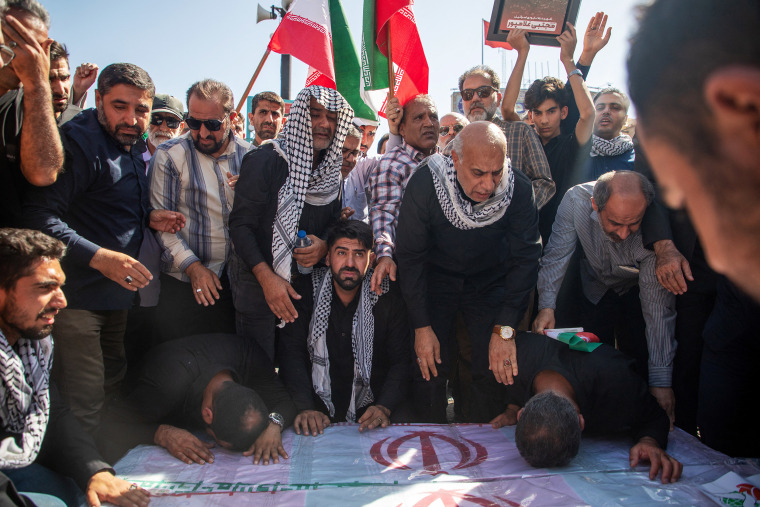
He also accused the United States of imposing “specific demands” on Iran, rather than looking for solutions. Trump’s calls for Iran to surrender were “very strange,” he said.
“The Iranian people have the right to defend their dignity, and they’ve done just that,” he added.
Iran's internet outage enters second day
Iran's internet has remained all but shut down for just over 24 hours, according to Netblocks, a company that tracks global internet connectivity.
Netblocks said in a statement on X that the outage is the most severe for the country since 2019 during a period of mass civil unrest.
Iran still has advanced missiles, Israeli intelligence official says
Only 65% of the missiles launched by Iran in the last 24 hours were intercepted by the country’s iron dome system versus almost 90% the day before, a senior intelligence official in Israel told NBC News.
“Iran still has very advanced missiles, and they are making use of them,” said the former top level Israeli intelligence official, who still receives daily government briefings.
The official, who is not authorized to speak publicly because of the sensitivity of the information, said that faster Iranian missiles launched in the last day have also given Israel less time to prepare before the projectiles approach their intended targets.
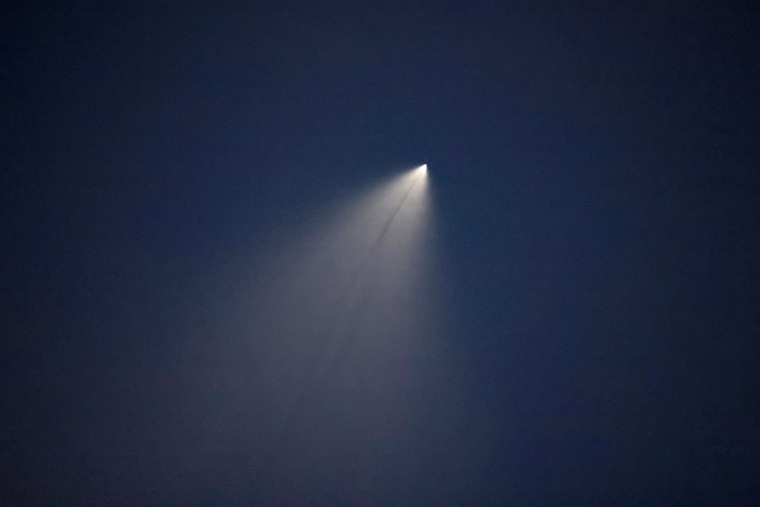
“Until yesterday, we got an early warning of about 10 to 11 minutes before the missiles actually fell. But this morning, it was six or seven minutes. It means that the missiles were probably much faster than the previous ones," the person said. "More importantly, the Iranians do have a navigation system for the final phase of the attack that helps them to be very precise and to attack exactly the targets that they wish, like the hospital today in Beersheba.”
A longtime observer of Iranian activities in the region, the official added that the regime, despite having suffered significant leadership losses when Israel launched its surprise attack last week, still has missile stockpiles that could sustain their retaliatory strikes for long stretches, describing their approach as “strategic patience.”
Arguing that some in Israel and across the region have written off the country’s response ability prematurely, he added that the regime has “the resolve and the ability to continue and to sustain the attacks so we have to be much more careful whenever we speak about the imminent collapse of the regime, which is far from being true.”
271 people hospitalized in Israel overnight
The Israeli Ministry of Health said in a statement that 271 people were hospitalized throughout the country overnight.
Of the 271 hospitalized, the health ministry said only four had "serious" injuries. At least 71 of the hospitalizations resulted from Iran's bombing of a surgical building at Soroka Medical Center in the city of Beersheba, according to the statement.
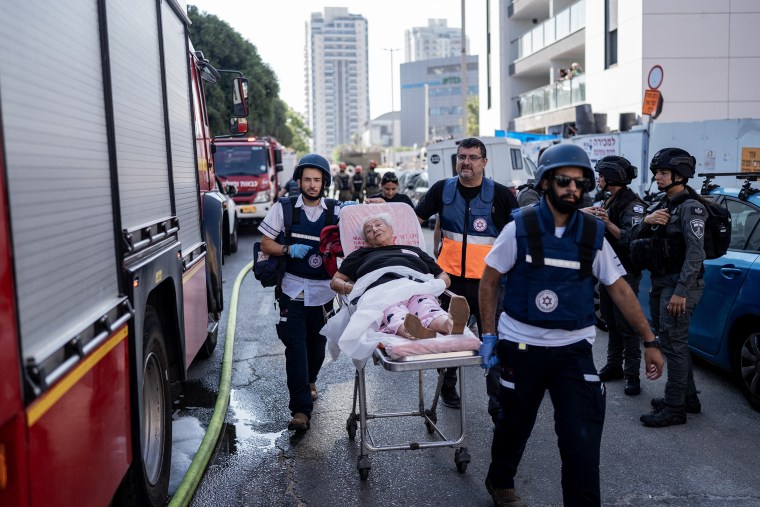
Since the conflict began seven days ago, the health ministry said 2,345 Israelis have been hospitalized, with a total of 21 of them suffering serious injuries.
The latest death toll in the country remains at 24. More than 600 people have been killed in Iran, according to The Associated Press.
Purpose-built parking garage welcomes Israeli newborns
Reporting from Haifa, Israel
At Rambam Hospital in the northern Israeli city of Haifa, Iranian bombs haven’t stopped Israeli babies.
Hospital staff, who have moved patients underground into a purpose-built parking garage, said they have helped deliver nearly 70 babies since the Iranian reprisal attacks on Israel began nearly a week ago.
All Israeli hospitals move their patients and staff to underground garages during bombardments, but Rambam is unique: Hospital staff say its parking garage is the only one that was constructed with handling patients in mind.

Instead of being a parking garage that can take patients, Rambam’s garage is a hospital that normally handles parked cars.
And on Monday, hospital staff accomplished a minor medical feat: doctors birthed triplets in a cesarean section procedure that the delivering physician said would have been complicated and risky even in the best of times.
“It was a unique kind of triplets. We had two placentas and three babies,” said Yadov Salt, 59, director of the division of fetal maternal medicine. “It’s even more complicated because of the space, because of the conditions.”
Haifa is Israel’s third-largest city but its proximity to Israeli defense installations means that it’s taken an outsized share of Iranian bombings.
Eliana, a 33 year-old nurse in the hospital’s plastic surgery department, was among the mothers who gave birth in the past week, entrusting her own colleagues with her care under fire.

“It wasn’t very nice because we were very afraid and it was very difficult,” she said, still wearing a dressing gown as she pushed her son Tiger’s crib into the maternity ward.
Eliana said she was terrified when she heard explosions just as the doctor prepared to insert her epidural. But the conventional birth proceeded without complications.
It was so smooth she said her son’s birth in the parking garage turned hospital was even better than her daughter’s peacetime birth several years ago.
“To be honest, it was such a good experience,” she said. “I was feeling very safe. I felt that everyone was there for me. They were rooting for me and they were very supportive.”
Iran says its launched fresh round of strikes against Israel
The Islamic Revolutionary Guard, the primary branch of Iran’s military, said in a statement on Telegram that it has begun a “new round of combined missile and drone attacks” on military sites in Haifa and Tel Aviv.
"An escalatory and impact-focused trajectory of missile operations targeting military and military-industrial sites remains on the agenda," the IRGC added.
Roughly an hour ago, the Israeli military said on X that a "barrage of ballistic missiles" were fired at northern Israel.
Collapsed roof and glass everywhere as cleanup begins at Soroka hospital
Reporting from Beersheba, Israel
In a barrage of early morning missiles fired by Iran, one hit the Soroka hospital in Beersheba, a small city in southern Israel which is largely surrounded by desert.
It is a major complex that can handle everything from births and prenatal care to cancer treatment.
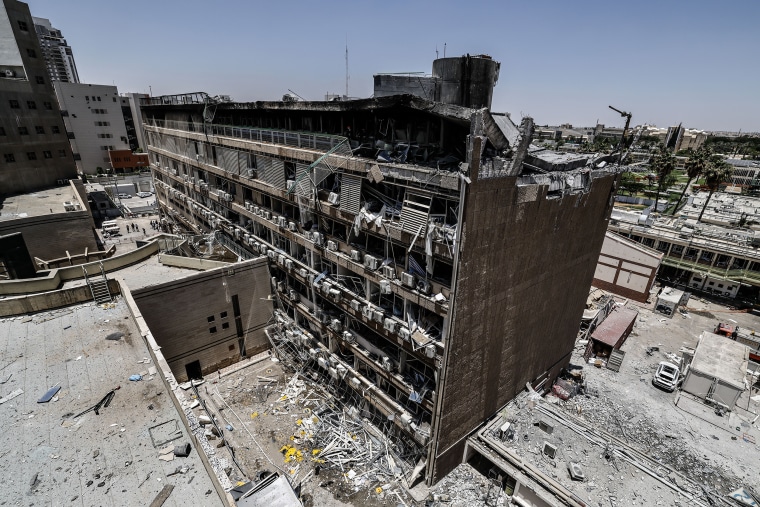
On first impression, it’s hard to see any damage at the front of the hospital, a large campus. But when you look behind, it is clear that a missile hit one of the complex's older buildings, collapsing the roof. The blast wave also shattered windows and other glass throughout much of the complex.
Nurses, orderlies and other staff were sweeping up the glass and debris, and slowly putting things back together. There didn’t seem to be much panic.
Hospital administrators said the building had already been evacuated because of the current tensions, and most of the patients had been moved to safer locations including underground hospitals.
Iranians should 'continue with strength,' supreme leader says
The Iranian people must continue their behavior “with strength” against Israeli attacks, the Islamic Republic's Supreme Leader Ayatollah Ali Khamenei said in a post on X.
“If the enemy senses that you fear them, they won’t let go of you,” he said.
Netanyahu visits Soroka hospital
Israeli Prime Minister Benjamin Netanyahu made a visit to Soroka hospital earlier today along with the health minister and the mayor of Beersheba, the southern city in which it is located.
“We are precisely hitting nuclear and missile targets, and they are hitting a hospital, where people cannot even get up and run away,” Netanyahu told reporters.
U.S. Embassy in Jerusalem issues security alert for citizens
The American Embassy in Jerusalem issued a security alert after Iran began firing a series of ballistic missiles into Israel earlier in the day.
The embassy said that the State Department was planning for contingencies to assist U.S. citizens with their departure from Israel and instructed all U.S. government employees and their family members to continue to shelter in place until further notice.
It asked all U.S. citizens and permanent residents currently in Israel or the West Bank to fill out a form to seek government assistance to depart the country.
Iran’s strike ‘no surprise’ for Israel, Israeli military spokesperson says
The IDF's spokesperson, BG Effie Defrin, said that Iran’s ballistic missile attack on the Soroka hospital in Beersheba, Tel Aviv, came as “no surprise” for Israel during a press briefing earlier today.
Iran has been “openly declaring their desire to destroy the State of Israel for decades now,” Defrin said, adding that the country had launched more than 450 ballistic missiles and hundreds of drones over the past six days.
“These aren’t just words,” he said, adding, “This is exactly why we cannot — and will not — allow this regime to obtain nuclear weapons or expand its missile arsenal.”
Photos: Funeral for Iranian Red Crescent members killed by Israeli strike
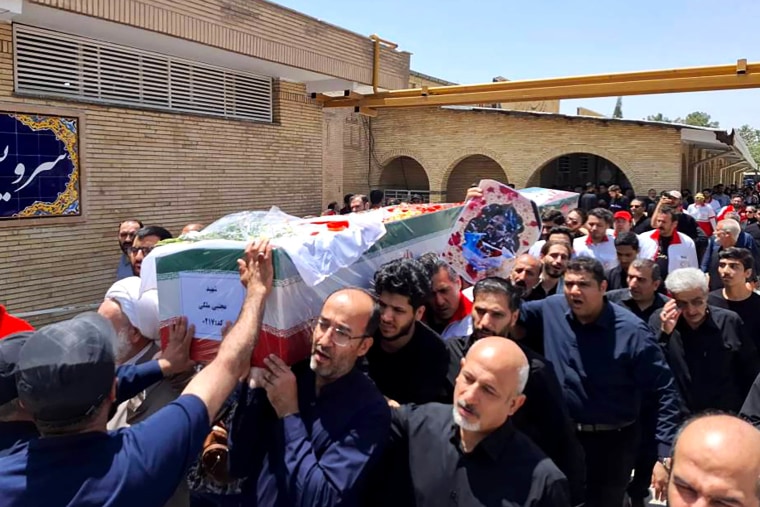

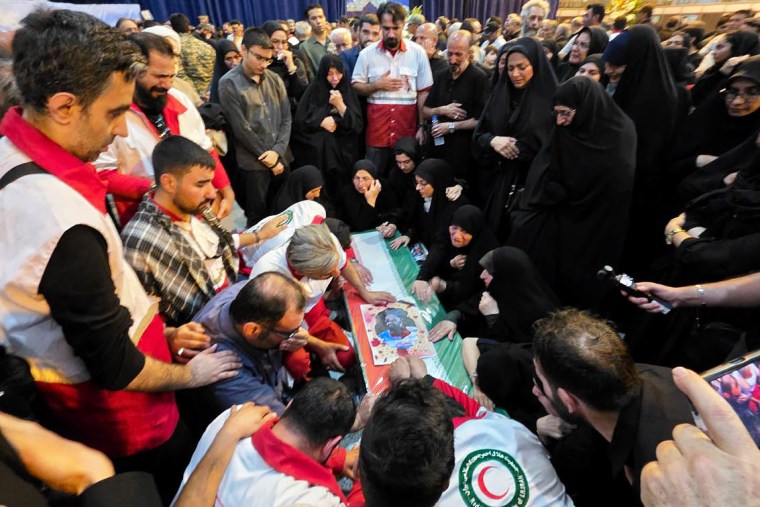
A funeral ceremony was held today for two emergency workers who were killed in an Israeli strike on an ambulance in Tehran, Iran. The ceremony was held behind closed doors, with only the families of the deceased and their colleagues in attendance.
Israeli leaders visit Soroka hospital after Iranian strikes
Israeli Prime Minister Benjamin Netanyahu did not rule out the possibility of assassinating Iran’s Supreme Leader Ayatollah Ali Khamenei during a visit to Soroka hospital in Beersheba after it was struck by Iranian ballistic missiles.
“All options are on the table,” the Israeli leader said on live television, referring to the toppling of the Ayatollah regime. “The Jewish people are helping the Persian people to be freed,” he added.
Earlier in the day, Israeli President Isaac Herzog also made a visit to the hospital and met with its director, along with doctors, nurses and patients, according to a post he made on X.
“We stood together and looked at the destruction and devastation caused by an Iranian missile fired indiscriminately with the sole intention to take innocent lives in a hospital,” Herzog said, adding, “This is a war crime!”
Iran's foreign minister confirms upcoming Geneva meeting with E.U. officials
Iranian Foreign Minister Abbas Araghchi confirmed that he would meet with the European Union's foreign policy chief, Kaja Kallas, in Geneva tomorrow, according to Iranian state news agency IRNA.
The meeting, requested by the European side, will also include the foreign ministers of the United Kingdom, France and Germany.
Iranian Health Ministry says Israeli strikes have injured more than 2,500 people
A spokesperson for the Iranian Health Ministry said today that more than 2,500 people had been treated in public and university hospitals since Israel began launching strikes into the country six days ago.
So far, 1,600 patients had been discharged while about 500 were still in hospital, the spokesperson said according to the Iranian news agency Mehr, adding that medical teams had also provided field care at more than 200 sites.

“Sadly, two medical workers were killed and several others, including university staff and their families, lost their lives in missile attacks,” the spokesperson added.
Iran has not been offering regular death tolls during the conflict and has minimized casualties in the past. In a previous update issued Monday, it put the death toll at 224 people, with 1,277 others being wounded.
That number differed vastly from a tally by the Washington-based group, Human Rights Activists, which said today that Israeli strikes had killed at least 639 people and wounded 1,329 others. That included 263 civilians and 154 security force personnel, the group added.
The group, which also provided detailed casualty figures during the 2022 protests over the death of Mahsa Amini, said it had cross-checked local reports in the Islamic Republic against a network of sources in the country.
Israeli defense minister says Iran’s Khamenei ‘cannot be allowed to continue to exist’
Israeli Defense Minister Israel Katz said today that Iranian Supreme Leader Ayatollah Ali Khamenei was a “dictator” who “cannot be allowed to continue to exist.”
Speaking to reporters on cameras at a missile impact site in Holon City, Katz added to his threat that one of the objectives of the Israeli military operation was to prevent Khamenei’s continued rule.
Radiation and chemicals would be least of workers' concerns if Fordo was bombed, expert says
If the United States does decide to bomb Iran’s most advanced and hardened nuclear facility, the main danger to workers there would be from the 30,000-pound ordinance itself, rather than any concerns over radiation or chemical contamination, an expert tells NBC News.
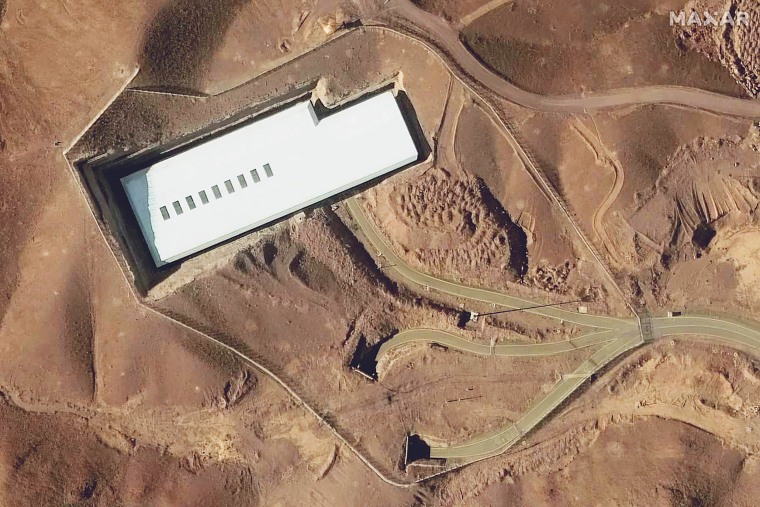
With Trump weighing strikes against Iran, one possible target would be the Fordo enrichment site, whose centrifuge tunnels are nestled 300 feet deep inside a mountain. Its fortress location means it might only be reachable by the GBU-57 Massive Ordnance Penetrator — or MOB — the largest nonnuclear bomb in the world, which only the U.S. has.
Even if this weapon was unleashed, “radiation is not a concern either for workers at the facility or for the nearest civilians,” according to Mark Nelson, founder and managing director of Radiant Energy Group, a research consultancy based in Chicago. That’s because “the nuclear substances at Fordo are only very weakly radioactive,” he said.
The chemicals produced in the enrichment process — namely hydrofluoric acid — are “particularly nasty, but there’s not a particularly large amount” of them at the site, he added. “Leaks of these materials becomes a concern for workers” at the facility — but “certainly not as big a risk as simply being around a targeted location in an active war,” he said.
Why Israel would want U.S. 'bunker busting' bombs
Reporting from Tel Aviv, Israel
A U.S. military intervention could change the conflict's dynamic by providing what Israel needs — the enormous “bunker busting” bomb that only the United States possesses, an Israeli official said.
It's powerful enough to effectively collapse the mountain of Fordo, where Iran is believed to be storing some of the more highly enriched uranium. If the U.S. drops this 30,000-pound bomb, the mountain could collapse, making it impossible for anybody to retrieve that highly enriched uranium.
But nuclear scientists have expressed great concern that if such an enormous bomb is dropped on a site where there are radioactive materials, it could release radiation into the air, effectively creating a dirty bomb.
An Israeli official dismissed that concern, saying that Israel and the United States would know how to execute such an operation in a way that doesn’t cause a nuclear fallout.
Iranian strikes 'precisely targeted' Israeli command center near hospital, military spokesperson says
Iran targeted the Israeli army’s command and intelligence center near a hospital with “high precision,” Iranian military spokesperson Iman Tajik said in a statement posted to Telegram that may have referred to the strike that hit Soroka hospital in the southern Israeli city of Beersheba.
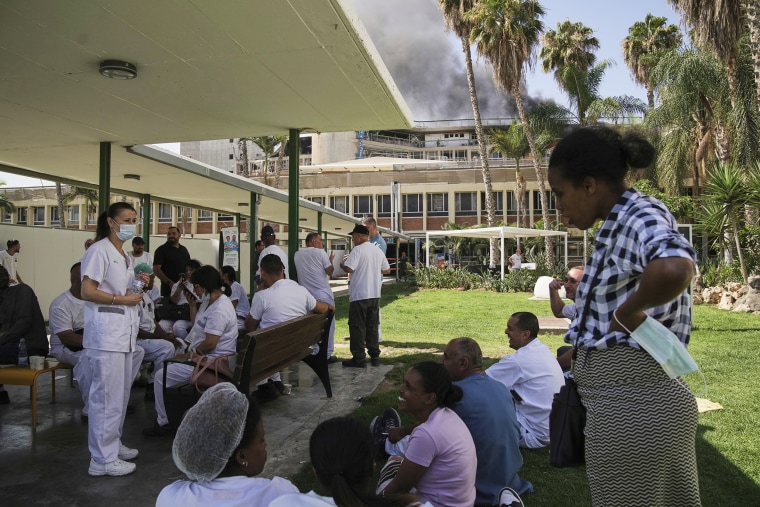
A combination of Iranian drones and strategic missiles had hit the location, Tajik said, adding, “Now, the world can see the intelligence capabilities and pinpoint accuracy of Iran’s armed forces missiles.”
Trump discussed Iran with Pakistan's chief of army staff
Reporting from Peshawar, Pakistan
A "detailed exchange of views" over Iran took place between Trump and Pakistan's chief of army staff, Field Marshal Syed Asim Munir, when the two met for lunch at the White House yesterday, the Pakistani military said in a statement today.
Though Pakistan, a nuclear state, has held close ties with Iran, its relations have recently worsened after several cross-border strikes.
Video footage shows aftermath of missile attacks on Soroka hospital
Verified footage from Soroka hospital in Beersheba shows extensive damage caused to the inside of the building after it was struck by an Iranian ballistic missiles, including a wrecked ceiling and blasted windows and doors in the main lobby and corridors.
In one video, people were seen standing amid the wreckage that included ceiling boards and debris strewn across the main lobby, where the entrance appeared to be blown out.
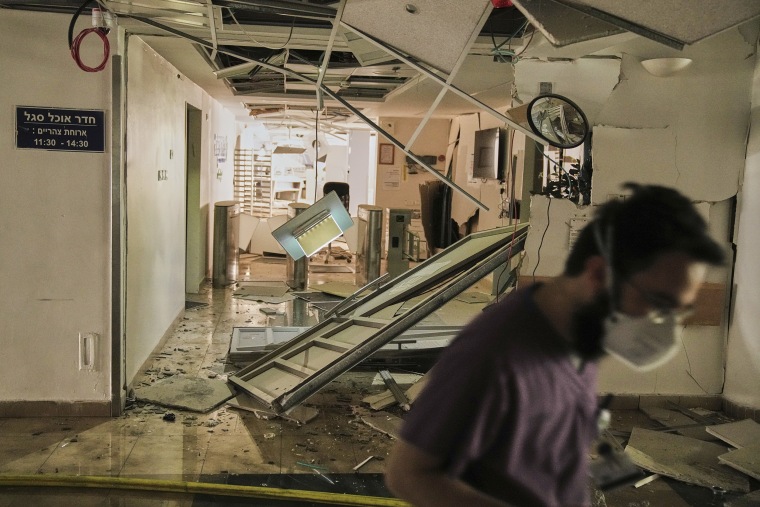
In another video, which was later shared in a post on X by Israeli Deputy Minister of Foreign Affairs Sharren Haskel, panicked hospital staff and patients were seen walking through hospital corridors filled with smoke and broken glass, metal and detritus scattered across the floors. A view through windows that faced a garden patio showed complete destruction outside, with dust and debris filling the air.
A statement from the hospital, which serves nearly 1 million residents in southern Israel, said that several parts of the medical center were damaged and that the emergency room was treating several minor injuries.
Putin and Xi condemn Israel for attacks on Iran
Russian President Vladimir Putin and Chinese President Xi Jinping condemned Israel for its strikes on Iran during a phone call held earlier today, the Kremlin said.
A handout by the Chinese government said that Putin stated that Israel's targeting of Iran's nuclear facilities was "highly dangerous," adding that escalating the conflict further "would benefit no one."
His Chinese counterpart said the recent escalation marked a new period of "turbulence and transformation," adding that brokering an immediate ceasefire between Israel and Iran was the top priority to protect civilians and ensure stability in the Middle East.
"The Israel-Iran conflict has sharply intensified regional tensions and poses a severe challenge to global security," the handout stated, adding, "The international community—especially major powers with influence over the parties—should work to defuse tensions rather than exacerbate them."
China will help citizens in Israel evacuate to Egypt tomorrow
Reporting from Hong Kong
China said it would help its citizens who wish to evacuate Israel through the Taba land crossing with Egypt starting tomorrow.
Chinese embassies in Israel, Azerbaijan, Turkmenistan and other countries in the region have also dispatched teams to assist at border checkpoints and facilitate their evacuation, a Chinese Foreign Ministry spokesperson said.
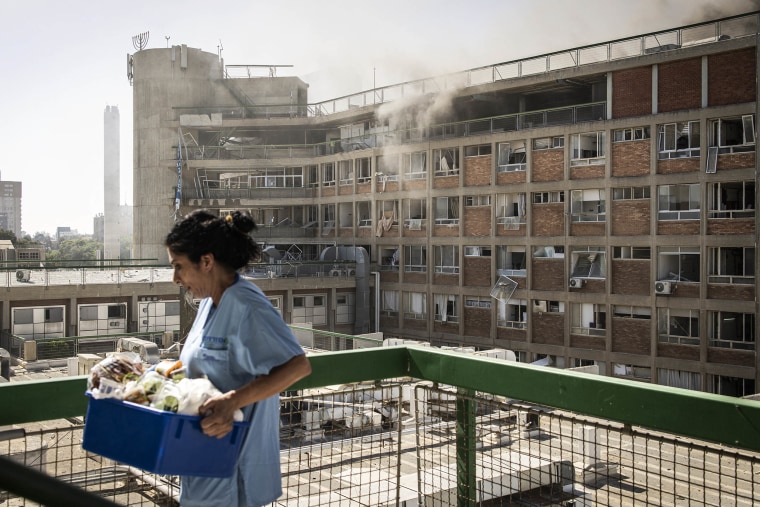
More than 1,600 Chinese citizens have been safely evacuated from Iran, the spokesperson said today, and several hundred have been evacuated from Israel.
The spokesperson said China was “deeply concerned” about the situation and “strongly urges the parties involved in the conflict, especially Israel, to prioritize the interests of the people in the region, immediately cease fire and end hostilities, and work to ease the current tensions.”
North Korea condemns Israel's strikes on its ally Iran
North Korea condemned Israel’s strikes on Iran, one of its few allies, saying Israel had “launched a reckless large-scale military attack.”
Israel’s attack on Iran is a “hideous act of aggression” that violates the sovereignty and territorial integrity of a sovereign state and is an “unpardonable crime,” the state-run Korean Central News Agency quoted a spokesperson for the North Korean Foreign Ministry as saying.
No radiological effects from strike on Iran reactor, U.N. nuclear watchdog says
Iran’s Arak nuclear reactor was not operational, the United Nations' nuclear watchdog said, and “contained no nuclear material, so no radiological effects.”
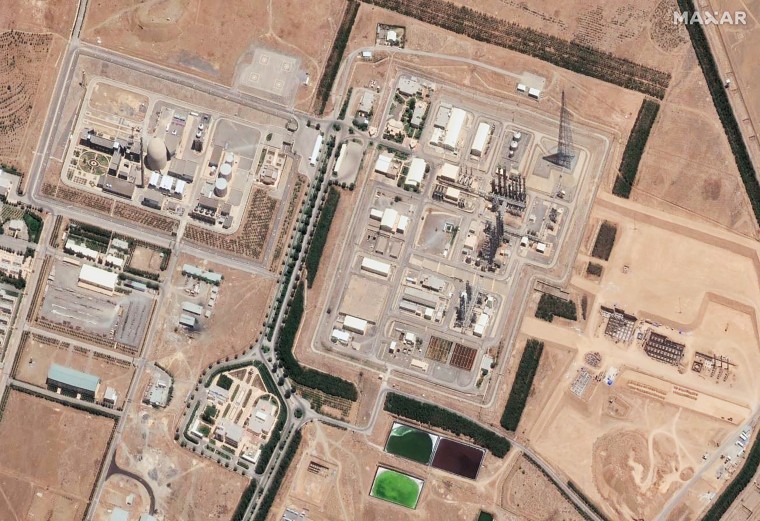
The International Atomic Energy Agency’s comments on X came after Israel said it had launched a series of strikes aimed at the facility, which was still under construction, to prevent it from being operationalized.
Israel has been 'crying wolf for 20 years' about Iran, senior lawmaker admits
Reporting from Tel Aviv
Israel has been “crying wolf for 20 years” about Iran’s nuclear capabilities “but now the wolf has really arrived,” the chair of Israel’s Foreign Affairs and Defence Committee told NBC News yesterday.
Asked why we should believe it now, Yuli Edelstein said that Israel had endangered its own citizens by launching its recent strikes on Iran. “We had to act now or it would be irreversible consequences,” he added.
Intelligence reports he had seen from Israel’s Mossad spy agency and other security sources indicated that Iran was “really becoming dangerously close” to achieving its goals, he said, adding that many of its programs “were run in disguise.”
While the Islamic Republic had “difficulties in terms of the enrichment and in terms of weaponizing the knowledge and the enriched uranium,” Edelstein said the Iranian regime had deliberated on whether pursuing nuclear ambitions was good or bad for it.
No country would start a military operation like the one Israel has launched against Iran “knowing for a fact that they have a potential of thousands of missiles,” he said.
The U.S. had military capabilities that Israel did not have, he said, referring to the GBU-57 A/B Massive Ordnance Penetrator bomb, known as the bunker buster. Weighing 30,000 pounds, it is thought to be the only weapon capable of penetrating Iran’s most advanced and hardened nuclear facility, the Fordo plant in the country’s northwest.
“We are not asking them to get involved,” Edelstein said, although he added that Israel would “greatly appreciate any kind of assistance and involvement.”
Pro-Israel hackers attack Iran’s largest crypto exchange, destroying $90 million
An anti-Iranian hacking group with possible ties to Israel announced an attack on one of Iran’s largest cryptocurrency exchanges on Wednesday, destroying nearly $90 million and threatening to expose the platform’s source code.
A group known as Gonjeshke Darande, or “Predatory Sparrow,” claimed the attack, making it the group’s second operation in two days. On Tuesday the group claimed to have destroyed data at Iran’s state-owned Bank Sepah amid the increasing hostilities and missile attacks between Israel and Iran.
Wednesday’s attack targeted Nobitex, one of Iran’s largest cryptocurrency exchanges. The platform allegedly helps the Iranian government avoid sanctions and finance illicit operations around the world, the hackers claimed in a message posted to its social media channels early Wednesday.
Putin urges Israel and Iran to figure it out
Russian President Vladimir Putin, while speaking with international news agencies earlier today, urged all participants in the Israel-Iran conflict to “look for ways to stop the military actions” and ensure the interests of both parties.
“This is a delicate issue, and of course, one must be very careful here,” the Russian leader said, before adding that he believed a solution could be found.
“In general, it is possible to ensure Iran’s interests in the field of peaceful nuclear energy and at the same time, we can remove Israel’s concerns regarding its security,” he said.
Arak nuclear reactor could have been restored to produce weapons-grade plutonium, IDF says
Israel said it attacked Iran's Arak nuclear reactor as parts of its effort to prevent Iran from obtaining a nuclear weapon.
Construction on the reactor, which Israel said was intended to produce weapons-grade plutonium for use in nuclear weapons, began in 1997 but was never completed. Though Iran had agreed to convert it to produce only low-grade plutonium, that process was never completed in what Israel said was a tactic to pressure the West.
“The strike targeted the component intended for plutonium production, in order to prevent the reactor from being restored and used for nuclear weapons development,” the Israel Defense Forces said in a statement.
The IDF had earlier issued an evacuation warning to area residents.
Trump on potential Iran strike: ‘I may do it. I may not do it.’
Trump said he has not made up his mind about whether to launch an airstrike on an Iranian nuclear facility. Trump said that Iran wants to restart negotiations after being battered by Israeli airstrikes, which Iran denied. Trump said he will not allow Iran to develop a nuclear weapon. NBC News’ Gabe Gutierrez reports.
Israel wants Iranian 'regime collapse' rather than regime change, ex-Obama envoy says
With all the discussion about Iranian regime change, the former Middle East peace envoy to President Barack Obama has some words of caution.
“In the unlikely event the regime falls, history shows that when the dust clears the Iranian military will still be calling the shots,” Frank Lowenstein, Obama’s special envoy for Israeli-Palestinian negotiations, tells NBC News. “Ultimately, it’s the guys with guns who decide who is in charge.”
Israel has denied its official policy is overthrowing the Iranian government — although Prime Minister Benjamin Netanyahu has openly mused on the idea. Lowenstein believes Israel does not want regime change but that “it’s more about regime collapse, and hoping something better emerges from the chaos.”
He said that in the past regime change was only possible in places such as Afghanistan and Iraq “when there was a significant ground force” and that he wasn’t “aware of any instances where air power alone was able to topple a regime.”
Even then, for the U.S. and other Western countries “the cost simply becomes too high over time,” he added. So “even when we are willing to devote the resources necessary to overthrow a hostile regime, we are not willing to pay the price to sustain the alternative.”
Photos: Missile strike in Ramat Gan
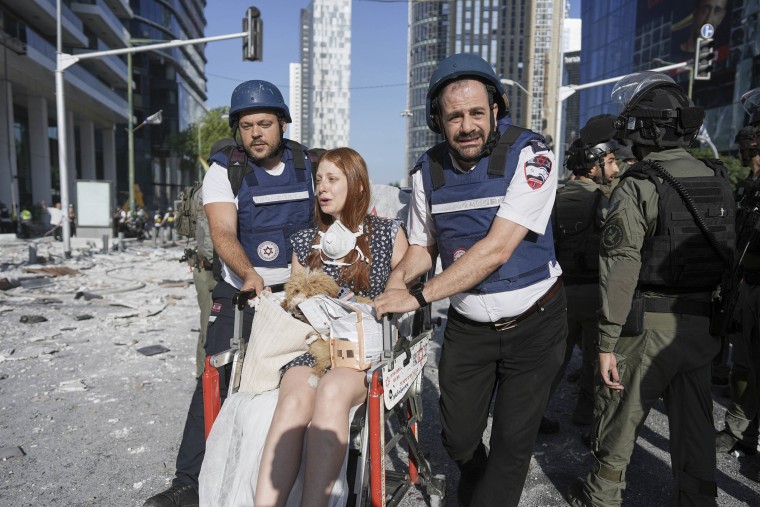
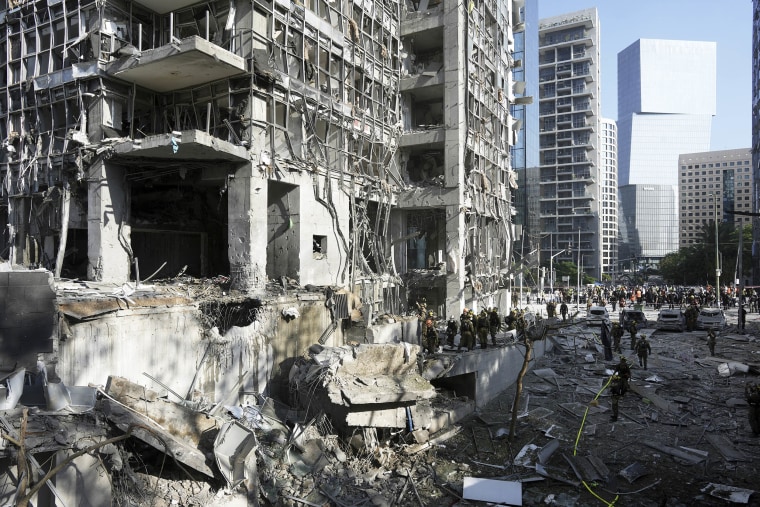

Video shows buildings destroyed after strikes in Ramat Gan, Tel Aviv
Footage from the city of Ramat Gan near Tel Aviv showed the damage caused earlier today to a high-rise building and several other residential buildings after the area was hit by an Iranian missile.
In the footage, filmed from another residential high-rise and verified by NBC News, heavy black smoke and dust was seen billowing from the ground where a building appeared to be severely damaged and blown-out.
Another video showed up-close the damage caused to a residential high-rise, including mounds of dust and rubble, shattered windows and exposed wiring. The street was lined with debris while the street lights appeared damaged. Emergency staff were also on the scene.
More than 400 rockets launched from Iran in the past week, Israel says
Israel said today that since it began Operation Rising Lion against Iran on Friday, Iran had launched more than 400 rockets and hundreds of drones, impacting more than 40 sites.
Twenty-four people in Israel have been killed and 838 have been injured, 11 of them seriously, officials said. More than 5,000 people have been evacuated from their homes, they said.
Photos: Inside Iran's destroyed national broadcaster HQ
Images from today showing the aftermath of an Israeli missile strike Tuesday on the headquarters of Iran's state broadcaster in Tehran.
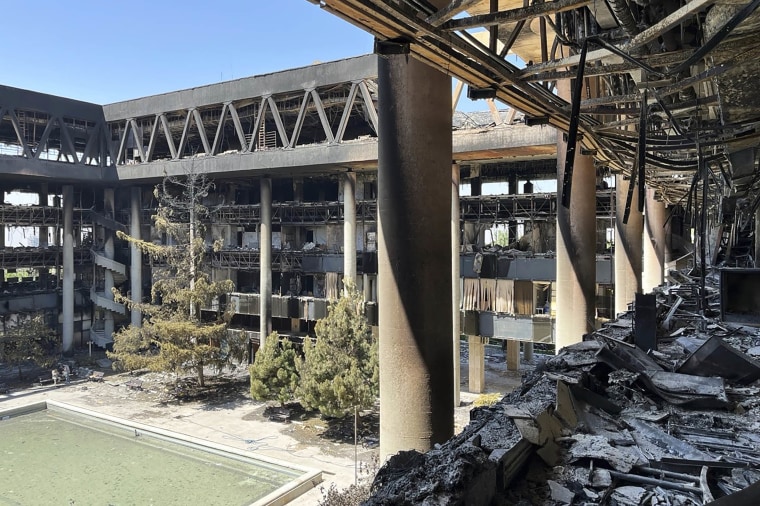
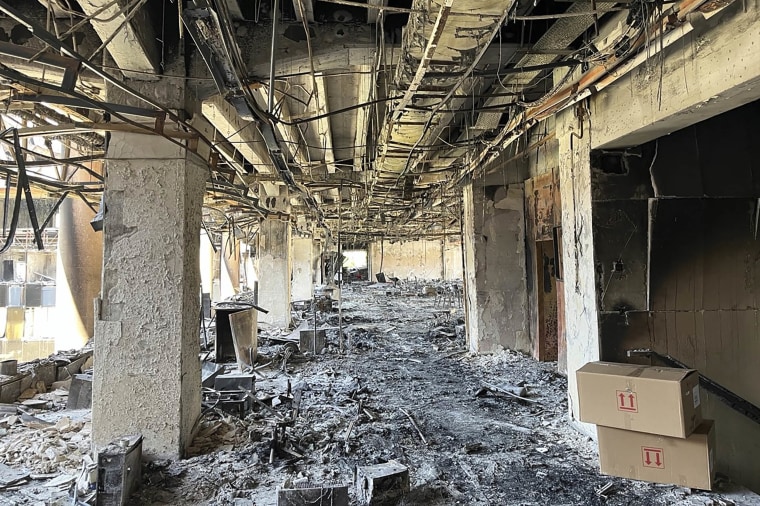
Iranian strikes injure 65 in Israel, emergency service says
At least 65 people were injured in Iran’s overnight strikes on Israel, the country’s Magen David Adom emergency service said.
That included three who were seriously injured, two who were moderately injured, 42 with shrapnel or blast injuries, and 18 who were injured while on their way to shelters, it said in a post on X.
Israel will 'increase the intensity of attacks,' defense minister says
Israeli Defense Minister Israel Katz said Iranian strikes on an Israeli hospital and residential buildings were “war crimes of the most serious kind” and that Iran’s supreme leader, Ayatollah Ali Khamenei, “will be held accountable.”
Katz said he and Prime Minister Benjamin Netanyahu had instructed the Israeli military “to increase the intensity of attacks against strategic targets in Iran and against government targets in Tehran in order to remove threats to the State of Israel and undermine the ayatollahs’ regime.”
Israeli leaders condemn Iranian strike on Israeli hospital
Israeli President Isaac Herzog and Prime Minister Benjamin Netanyahu condemned an Iranian missile strike on a hospital in southern Israel.
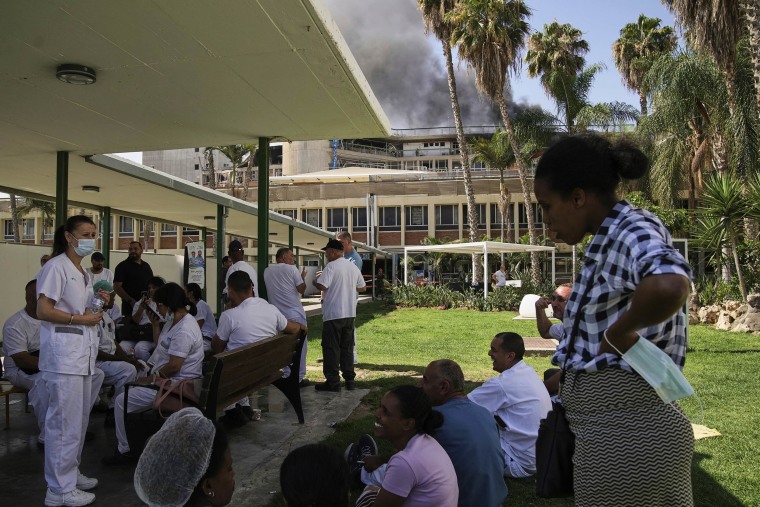
Soroka Medical Center, which is in the city of Beersheba, serves the entire Negev desert region, “caring for Israelis of all faiths and our neighbors the Palestinians who come especially to be treated there,” Herzog said in a post on X.
“I send strength and support to the medical teams, to the patients, and to the residents of Be’er Sheva and all cities attacked across Israel this morning,” he said. “In moments like these, we are reminded of what’s truly at stake, and the values we are defending.”
In a post on Telegram, Netanyahu said, “We will exact the full price from the tyrants in Tehran.”
Sharren Haskel, Israel’s deputy minister of foreign affairs, called the hospital strike “deliberate” and “criminal.”
“The world must speak out,” Haskel said in a post on X.
Iranian missile hits hospital in southern Israel, officials say
An Iranian ballistic missile hit a hospital in southern Israel, causing “extensive damage in several areas,” Israeli officials said today.
The old surgical building at Soroka Medical Center in the city of Beersheba suffered “a significant impact,” a spokesperson said, adding that several people were being treated for mild injuries.
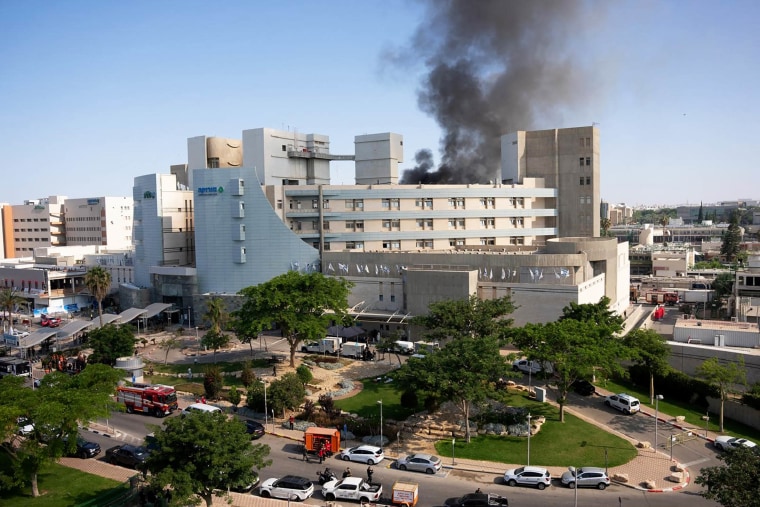
The spokesperson said all hospital buildings were being inspected and that the hospital was currently closed to all activity except life-saving care.
Israel says it struck inactive nuclear reactor
The Israeli military said it struck dozens of military targets in Iran overnight, including an inactive nuclear reactor in Arak, where it had earlier warned local residents to evacuate.
The strike on the reactor, whose construction was never completed, “targeted the component intended for plutonium production, in order to prevent the reactor from being restored and used for nuclear weapons development,” the Israel Defense Forces said in a statement.
The air force also struck a nuclear weapons development site in the area of Natanz. The site “contained components and specialized equipment used to advance nuclear weapons development, and projects designed to accelerate the regime’s nuclear program were hosted there,” the IDF said.
It said Israel had used 40 fighter jets and more than 100 munitions to carry out its latest strikes, which also hit military production sites, air defense batteries, surface-to-surface missile storage sites and detection radar systems.
Israeli strikes on Iran have killed at least 639, rights group says
Israeli strikes on Iran have killed at least 639 people and wounded 1,329 others, a human rights group said today.
The Washington-based group Human Rights Activists offered the figures, which covers the entirety of Iran. It said of those dead, it identified 263 civilians and 154 security force personnel being killed.
Human Rights Activists, which also provided detailed casualty figures during the 2022 protests over the death of Mahsa Amini, crosschecks local reports in the Islamic Republic against a network of sources it has developed in the country.
Iran has not been offering regular death tolls during the conflict and has minimized casualties in the past. Its last update, issued Monday, put the death toll at 224 people being killed and 1,277 others being wounded.
Senators to receive classified briefing on Iran next week
Senate Minority Leader Chuck Schumer, D-N.Y., confirmed that there will be a classified briefing on Iran early next week for all senators.
Trump said yesterday that he hasn’t yet decided how to handle the intensifying conflict between Israel and Iran, which is now in its seventh day after the two heavily armed rivals launched new attacks against each other overnight.
Catch up on our coverage
- Trump and U.S. intelligence appear at odds over Iran’s nuclear progress
- Tulsi Gabbard sidelined in Trump administration discussions on Israel and Iran
- B-2 stealth bombers and 30,000-pound bunker busters: Why striking Iran’s nuclear sites is such a difficult feat
- Will Israel’s airstrikes cause the collapse of the Iranian regime?
- Amid escalating global tensions, Trump struggles to be a ‘peacemaker’




















